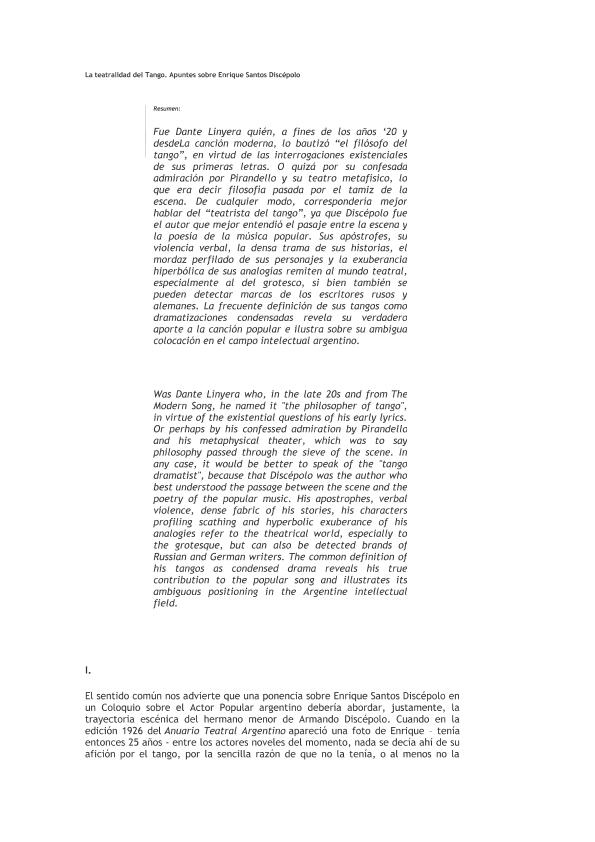Mostrar el registro sencillo del ítem
dc.contributor.author
Pujol, Sergio Alejandro

dc.date.available
2018-05-22T19:48:33Z
dc.date.issued
2014-12
dc.identifier.citation
Pujol, Sergio Alejandro; La teatralidad del tango. Apuntes sobre Enrique Santos Discépolo; L. Verzero; Y. A. Leonardi; Afuera; X; 14; 12-2014
dc.identifier.issn
1850-6267
dc.identifier.uri
http://hdl.handle.net/11336/45908
dc.description.abstract
Fue Dante Linyera quién, a fines de los años ‘20 y desdeLa canción moderna, lo bautizó “el filósofo del tango”, en virtud de las interrogaciones existenciales de sus primeras letras. O quizá por su confesada admiración por Pirandello y su teatro metafísico, lo que era decir filosofía pasada por el tamiz de la escena. De cualquier modo, correspondería mejor hablar del “teatrista del tango”, ya que Discépolo fue el autor que mejor entendió el pasaje entre la escena y la poesía de la música popular. Sus apóstrofes, su violencia verbal, la densa trama de sus historias, el mordaz perfilado de sus personajes y la exuberancia hiperbólica de sus analogías remiten al mundo teatral, especialmente al del grotesco, si bien también se pueden detectar marcas de los escritores rusos y alemanes. La frecuente definición de sus tangos como dramatizaciones condensadas revela su verdadero aporte a la canción popular e ilustra sobre su ambigua colocación en el campo intelectual argentino.
dc.description.abstract
Was Dante Linyera who, in the late 20s and from The Modern Song, he named it "the philosopher of tango", in virtue of the existential questions of his early lyrics. Or perhaps by his confessed admiration by Pirandello and his metaphysical theater, which was to say philosophy passed through the sieve of the scene. In any case, it would be better to speak of the "tango dramatist", because that Discépolo was the author who best understood the passage between the scene and the poetry of the popular music. His apostrophes, verbal violence, dense fabric of his stories, his characters profiling scathing and hyperbolic exuberance of his analogies refer to the theatrical world, especially to the grotesque, but can also be detected brands of Russian and German writers. The common definition of his tangos as condensed drama reveals his true contribution to the popular song and illustrates its ambiguous positioning in the Argentine intellectual field.
dc.format
application/pdf
dc.language.iso
spa
dc.publisher
L. Verzero; Y. A. Leonardi
dc.rights
info:eu-repo/semantics/openAccess
dc.rights.uri
https://creativecommons.org/licenses/by-nc-sa/2.5/ar/
dc.subject
Teatro
dc.subject
Cultura
dc.subject
Tango
dc.subject
Argentina
dc.subject.classification
Otras Artes

dc.subject.classification
Arte

dc.subject.classification
HUMANIDADES

dc.title
La teatralidad del tango. Apuntes sobre Enrique Santos Discépolo
dc.type
info:eu-repo/semantics/article
dc.type
info:ar-repo/semantics/artículo
dc.type
info:eu-repo/semantics/publishedVersion
dc.date.updated
2018-01-15T17:34:43Z
dc.journal.volume
X
dc.journal.number
14
dc.journal.pais
Argentina

dc.journal.ciudad
Buenos Aires
dc.description.fil
Fil: Pujol, Sergio Alejandro. Consejo Nacional de Investigaciones Científicas y Técnicas; Argentina. Universidad Nacional de La Plata; Argentina
dc.journal.title
Afuera
dc.relation.alternativeid
info:eu-repo/semantics/altIdentifier/url/http://www.revistaafuera.com/articulo.php?id=312&nro=14
Archivos asociados
